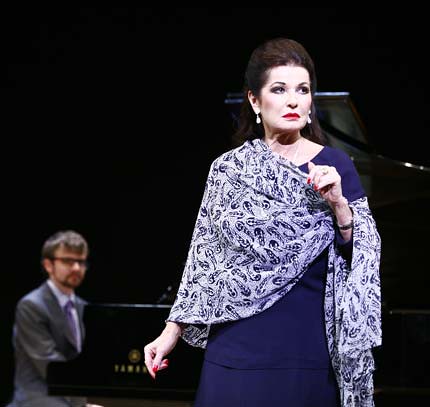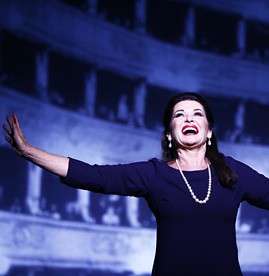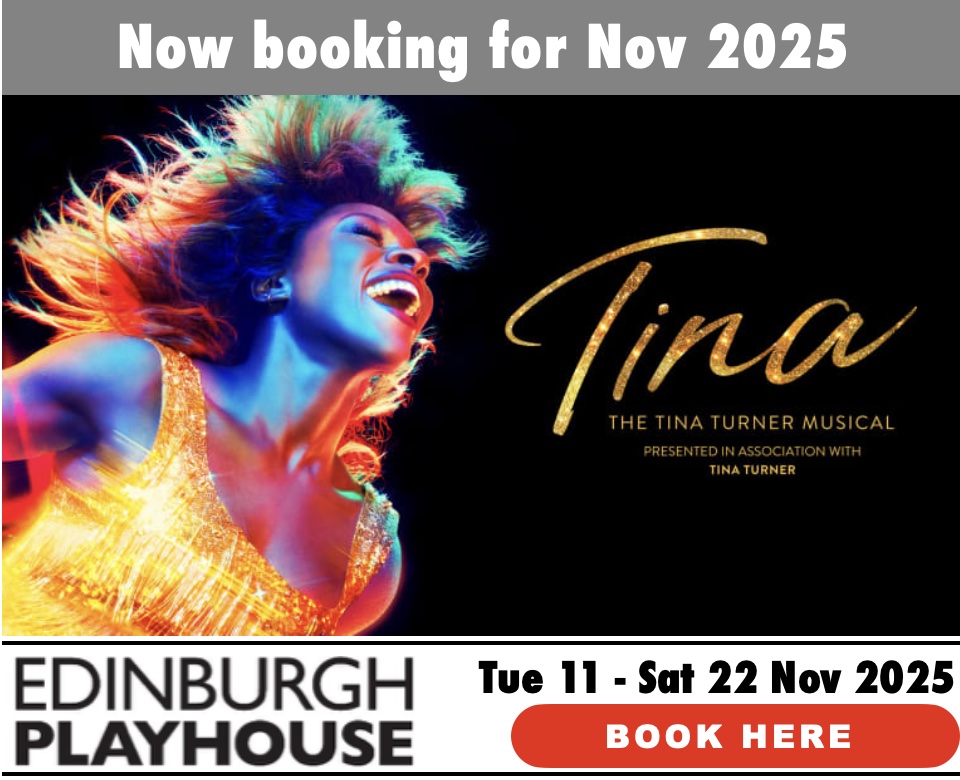Æ Review – Master Class
* * * *
King’s Theatre
By Thom Dibdin
There are several separate master classes going on at the King’s Theatre this week, where Stephanie Beacham is playing Maria Callas in the Tony-award winning play by Terrence McNally.
The first of these is Maria Callas’s master class, based on a series of real classes the US-born opera diva gave at the Juillard School, New York in the winter of 1972.
Out she strides, onto the bare stage with the house lights up, all poise and presence as she proceeds to humiliate, confuse and generally pontificate to her audience. Which is as nothing to her ascerbic destruction of the trio of young singers who have attended her class when the lights eventually do go down.
By that time, the die is set for the on-stage persona of the singer who grew up in Greece during WW2. She is brutal although not malicious – her comments might be sore for their recipients to receive but the advice is honest and truthful. It is also self-contradicting and self-centred as she panders to her own desire to reminisce.
It seems that her exploits are dashing the youngster’s dreams – or at least those of the sopranos. The tenor (Christopher Jacobsen) gets a far easier ride and goes away all the less enlightened for it. But at the same time, she is forcing them to understand their chosen music, to find and recreate the pain and turmoil of the great arias they are singing.
The second master class is Stephanie Beacham’s. It is a master class in how to create a character based on a real person and bring them convincingly to life. Just as her subject’s class is slightly flawed, the Dynasty star’s is too, although to a rather more minor – and certainly ego-less – extent.
Still clinging to Beacham’s large, broad Greek accent there are just a few too many softly lingering English vowels, particularly when Callas wafts off into moments of reverie over nights at La Scala when the applause when on for 36 curtain calls, driving her into ecstasies even though her personal life was falling apart.
Otherwise Beacham is spot on. Indeed, she follows Callas’ own advice of making her audience believe that, at this particular time, on this particular night, there is only one way to play the character, and that is the way she is doing it.
Of course that line is written, or at least chosen, by Terrence McNally. And if there is a third master class going on here, it is his. An exercise in using and choosing material to illuminate the subject.
Opera has to be at the heart of the play. After all, that is where Callas made her name, even if her fame grew even more through her association with Aristotle Onassis.
This is still very much a play, however, and McNally is rather more clever than to just slap the opera on top of the script. He weaves it in, so it is the drama, the passion and the emotional depths of the pieces discussed which add to the whole – rather than the music itself.
So the first piece, which the trembling young soprano Sophie de Palma played by Robyn North quite fails to sing, is Bellini’s La Sonnambula. “Yeah, great!” you might think as she sets out, only to be halted with the first note still welling up in her vocal chords, “that was the opera which Callas actually did sing on the stage of the King’s”.
A titillating footnote to the EIF of 1957
There is rather more to the choice of piece than a titillating footnote to the Edinburgh International Festival of 1957, when Callas sang for four performances – famously refusing to sing a fifth that the Piccola Scala had agreed to without booking her in to sing the role.
That footnote reveals Callas instead returned to Italy while the Piccolo Scala and the EIF let it be known that she was ill and could not sing – only to be photographed at a party in Venice on the night when she was supposed to have been performing in Edinburgh.
The aria, as Beacham has Callas so eloquently explain, translating the Italian lyrics in spoken word over pianist David Narvey’s accompaniment, is of a girl whose lover has left her for another. Increasingly bitter and deeply effected by the words, Callas finishes with the scathing note that he has run off and married a princess.
As an echo of Callas’ own life, in which her lover Aristotle Onassis ran off and married Jackie Kennedy, it is perfectly emphasised. It also explained how opera itself is not just about the tunes, but about the emotions they portray.
The second soprano aria, sung (eventually) by Sharon Graham, is the letter scene from Verdi’s Macbeth. Again, it is a piece which allows Callas to weave her life into her telling of the plot, as Lady Macbeth receives the letter in which Macbeth reveals the witch’s predictions of his rise to power.
The last master class is the balance of Jonathan Church’s concise and brilliantly timed direction. McNally makes the words echo the emotion of the music; Callas’ recorded voice brings that music to life; while Beacham’s Callas makes the words come to life. All told a true Master Class.
Run ends Saturday
ENDS



















